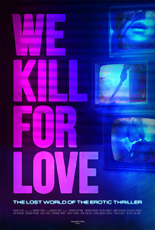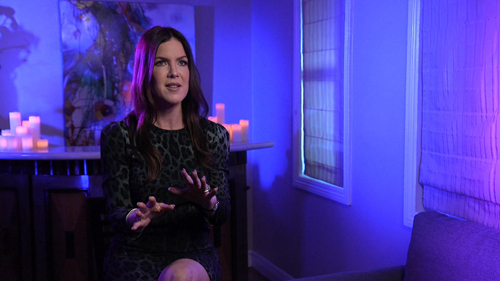
 Danger, romance and seduction: the holy trinity of a now-extinct film subgenre that kept beautiful, busty women named Shannon employed for the better part of the 1990s. Besides the obvious visual attributes, what made those flicks tick? Where did they come from? More importantly, why did they disappear?
Danger, romance and seduction: the holy trinity of a now-extinct film subgenre that kept beautiful, busty women named Shannon employed for the better part of the 1990s. Besides the obvious visual attributes, what made those flicks tick? Where did they come from? More importantly, why did they disappear?
Filmmaker Anthony Penta answers all in his remarkable documentary, We Kill for Love: The Lost World of the Erotic Thriller, a penetrating deep dive into a VHS and Cinemax mainstay. From bioluminescence to tumescence, Zalman King to Jim Wynorksi, and Eyes belonging to the Bedroom and the Night, Penta explores wide terrain across an astounding number of movies, including Irresistible Impulse, Virtual Desire, Deadly Embrace and others with names seemingly spit out by the Tweed-O-Matic Instant Erotic Thriller Title Generator (see page 427 of Flick Attack Movie Arsenal: Book One). It’s anything but a surface-level look, surpassing what easily could have been a promotional puff piece.
In laying the foundation of the erotic thriller’s history, Penta’s main thrust draws a direct line from 1940s film noir to these sensibly financed suspensers of simulated sex. Don’t know why I never thought that before, but I’ll be damned if he isn’t right! The difference being I never wanted to see Barbara Stanwyck without clothes.

While it’s clear Penta loves these straight-to-video pictures, his perspective is hardly the only represented. In addition to heavy hitters like Kira Reed Lorsch and Athena Massey, we get a panoply of voices, resulting in filmmakers’ examinations, participants’ set reminiscences and academics’ feminist readings, both for and against. Clips abound as Penta and company discuss tropes you might have missed (overhead fans) and those impossible to escape your notice (“so many candles”). With Andrew Stevens, who deserves props for jump-starting the trend, and Monique Parent, who looks better than ever, among the storytellers, We Kill for Love continually fascinates. The research and grunt work behind its eight-year gestation period is all on the screen.
Personally, I found most erotic thrillers to be boring, but finding the occasional gem — say, Private Obsession, Animal Instincts and Body Chemistry — more than made up for the time spent getting dirty in the mines. We Kill for Love is never boring, and we’re talking about a cup that runneth over with 163 minutes. The documentary is so well-built and cut, viewers will be engaged for its entirety. Besides, it’s not the length that matters, right?
In the grand scheme that is film history, these movies were as fleeting as an orgasm. The big-budget icons like Fatal Attraction and Basic Instinct still enjoy life in our pop-culture conversation, yet the hundreds of sadly ephemeral imitators not constructed as star-studded blockbusters — your Sexual Roulette and your Turn of the Blade — are what Penta celebrates, because who else would? As Samantha Fox once sang, naughty girls need love, too. —Rod Lott
